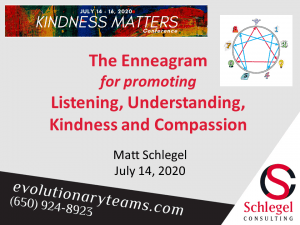In this video segment, I share how you can use the Enneagram to find the “Superhighway” that enables team members to excel in their role. Grateful to Mari-Lyn Harris and Heart@Work (www.heartatworkonline.org) for the opportunity to share topics in my book Teamwork 9.0–Successful Workgroup Problem Solving Using the Enneagram on Mari-Lyn’s Impactful Legacy Podcast.
You can watch the entire interview here: https://www.youtube.com/watch?v=QsNRJlLETdw
Video Transcript
[Mari-Lyn Harris] I wonder if people would start to hire based on their number. We’re looking for a person for this role in the company, gee we need a number 2 or we need a number 8.
[Matt Schlegel] You know, so when I was–this was a long time ago–when I first started studying this as a manager, and I read this book called “First, break all the rules,” a very popular management book, and I’m like, “oh, this makes sense.” The rule essentially says that you find the right person for the role–that you don’t assume that anybody can be anything. A lot of us are told if you try hard enough, you can do anything you want–that you can be anything. And this book essentially says no, that’s the rule you’ve got to break–that there really are people who are designed for to excel at certain things. And they call it in the book having a “superhighway” or a “bumpy country lane.” You’ll still get there, but it will just take you a lot longer. If you’re on a superhighway, you’ll get there very fast. So I read this book and I was like, “this is great.” This was before I knew about the Enneagram. What it didn’t answer, though, was how do I figure out who has that superhighway that will get you there the fastest,. And, once I understood the Enneagram that’s when I understood that it is a framework for understanding everybody’s superhighway, the thing that they are going to excel at. And that way, if you understand that, then you can put them in that role, they will do well, they will be happy, and you’ll just have a good fit.
[Mari-Lyn Harris] For me I got to say, “oh I can start.” I’m very new at it of course but sometimes I can recognize their behavior and attune it to the Enneagram and what the number right be and now I have a book and I look at it and that’s how you can respond to that person and that’s why I’m becoming more and more of a big fan of it just because I can see how it improves the workplace communications, your relationships, whether you’re at work or you’re at home
[Matt Schlegel] Yes, absolutely. You illustrate a really good point is that certain types are drawn to certain roles. You know, so Type 2s love to help people so they’re drawn to roles where they can continuously help people and so you’ll find them in service roles, nurses, teachers, things like that but even in organizations taking operational and service roles within the company because they are supporting and helping people all the time that’s what they love to do and that’s what they feel comfortable with and they tend to migrate to those roles. And that’s the other fascinating thing is that you’re seeing how certain types really can essentially thrive and allow themselves to contribute all of their natural gifts to the team when they’re put in the right role.



